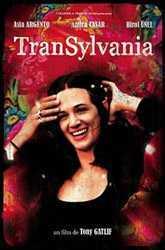
♦ ‘Gadjo Dilo’ ↓ [1998]
In this comedy-drama, Stephane (Romain Duris), a young man from France («Payo loco» = ‘The Crazy Stranger’), travels to Romania on a mission; his father has recently passed away, and since the old man’s favorite singer was an unrecorded gypsy vocalist from Romania, he has come to track her down and put her music on tape. However, he’s not sure where she is, and as he wanders though a village in battered shoes on a cold night, an older gentleman of gypsy blood, Izidor (Isidor Serban) allows him to spend the night in his home after regaling him with drunken rants about his dire fate.
While gypsies take a dim view of strangers, Stephane goes out of his way to ingratiate himself into their community, and as the locals develop a grudging trust for him, Stephane meets Sabina (Rona Hartner), a beautiful gypsy dancer whose allure is matched by her fiery personality and blunt vocabulary. . .
~ Mark Deming, Rovi [rotten tomatoes]
«We are all wanderers on this earth. Our hearts are full of wonder, and our souls are deep with dreams.» (Rom proverb)♦ ♦ ♦ Latcho Drom ↓ [«Safe journey»_1993]
A first-class introduction to Romani culture. Tracing a chronological 1,000-year-old path of Gypsy migration from Rajasthan to Spain, it features a myriad of different styles from the Indian subcontinent, Egypt, Turkey, Romania, Hungary, Slovakia, France, and the flamenco Gypsies of Barcelona. Many well-respected acts like Taraf de Haidouks and Hasam Yarim are featured as well as many unknown but extremely talented Gypsy artists.
… Taraf de Haïdouks ↓
. . . Tchavolo & Dorado Schmitt ↓
∇ Remedios Amaya … Manuel Vargas … La Caíta… ↓
«The dog that trots about finds a bone.» – Gypsy Proverb
♦ ‘Vengo’ [2000] ↓ ‘nací en Alamo’ [Remedios Silva Pisa]
Tony Gatlif has infused the film Vengo with music, dances and images that are used as symbols representing the continued cycles of rise and fall as well as intermingling of various cultures over generations in the Andalucia region of Spain.
◊→ ‘Vengo’ ← [2000] Sufi-Flamenco scene [Tomatito & Sheikh Ahmad Al Tuni]
♦ Transylvania ⇓ (2006)
 An Italian woman intent on tracking down the Romany musician who impregnated her becomes lost in a world of Gypsies in director Tony Gatlif’s meditative road drama. Convinced that her one-time lover Milan (Marco Castoldi) has been deported by French authorities and determined to let him know about his unborn child, Zingarina (Asia Argento), travels to Romania in the company of her motherly friend Marie (Amira Casar) in hopes of seeking out the elusive musician. Though Zingarina does eventually track Milan to a remote village festival, the rejection she is faced with soon drives the troubled mother-to-be to ditch her friend Marie during the trip back to France. Now wandering the Romanian countryside as her future grows ever more bleak, Zingarina enters into a tentative romance with itinerant trader Tchangalo (Birol Ünel), whose gruff exterior masks a sensual inner beauty. ~ Jason Buchanan, Rovi
An Italian woman intent on tracking down the Romany musician who impregnated her becomes lost in a world of Gypsies in director Tony Gatlif’s meditative road drama. Convinced that her one-time lover Milan (Marco Castoldi) has been deported by French authorities and determined to let him know about his unborn child, Zingarina (Asia Argento), travels to Romania in the company of her motherly friend Marie (Amira Casar) in hopes of seeking out the elusive musician. Though Zingarina does eventually track Milan to a remote village festival, the rejection she is faced with soon drives the troubled mother-to-be to ditch her friend Marie during the trip back to France. Now wandering the Romanian countryside as her future grows ever more bleak, Zingarina enters into a tentative romance with itinerant trader Tchangalo (Birol Ünel), whose gruff exterior masks a sensual inner beauty. ~ Jason Buchanan, Rovi
◊ Korkoro ↓ («Freedom») [trailer _ 2009]
Korkoro («Alone» in the Romani language) is a 2009 French drama film written and directed by Tony Gatlif, starring French actors Marc Lavoine, Marie-Josée Croze and James Thiérrée. The film’s cast were of many nationalities such as Albanian, Kosovar, Georgian, Serbian, French, Norwegian, and the nine Romanies Gatlif found in Transylvania.
Based on an anecdote about the Second World War by the Romani (Gypsy) historian Jacques Sigot, the film was inspired by the true life of a Romani who escaped the Nazis with help from French villagers, and depicts the rarely documented subject of Porajmos (the Romani Holocaust). Other than the Romanies, the film has a character representing the French Resistance based on Yvette Lundy, a French teacher deported for forging the passports for Romanies. Gatlif intended the film to be a documentary, but the lack of supporting documents caused him instead to present it as a drama.
«You don’t kill a gypsy by cutting him in ten pieces – you only make ten more gypsies.»
– Gipsy Proverb♦ Canta Gitano / Corre Gitano ↓ [1982]

Deja un comentario